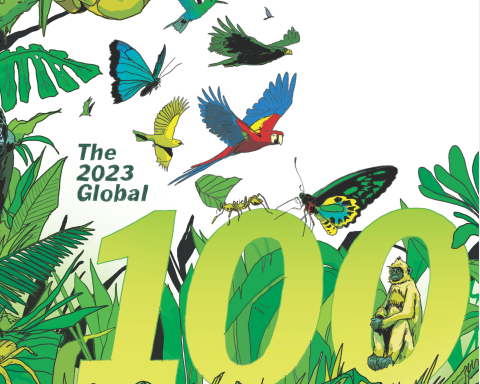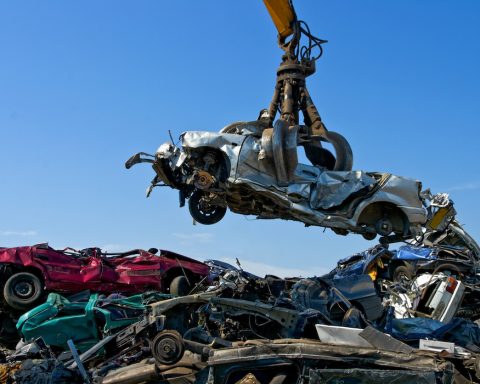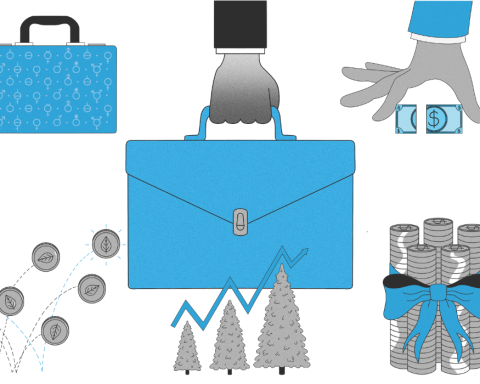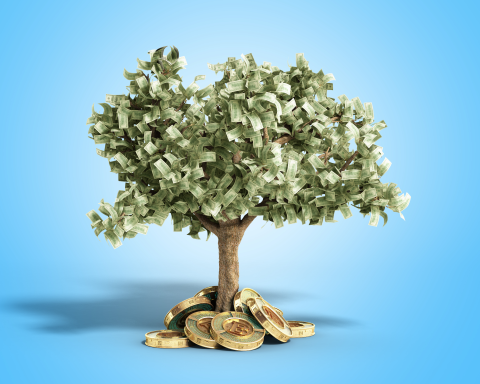There is no such thing as guilt-free flying. Neste, a Finnish biofuels maker, is trying to change that.
Passenger jets have voracious appetites. A Boeing 747 will burn about four litres of fuel every second. Assuming the tanks are topped up, the fuel alone weighs almost as much as the empty plane. A single transatlantic round trip produces the equivalent of one tonne of carbon dioxide per passenger, according to the British oil company BP.
You get the idea. Aviation’s share of global greenhouse gas emissions may seem trivial, at about 2.5%, but the figure will rise as air travel becomes more popular – the industry’s growth has always exceeded its efficiency gains. If airlines are to meet their net-zero commitments by 2050 – a goal set in 2021 by the industry’s trade association, the International Air Transport Association – they will have to find a substitute for fossil fuels fairly quickly.
But how? You cannot fly a large passenger plane on battery power – a 250-seat airborne Tesla seems like a fantasy at this point. Ditto commercial hydrogen-powered planes or those that run on synthetic fuels. While work on these technologies is underway (Rolls-Royce recently made a big to-do of testing a green hydrogen-fuelled jet engine), they may not become commercially viable for decades. “For the foreseeable future, these technologies will not be the solution,” says Fatima da Gloria, vice-president of sustainability at Air France-KLM. “So SAF are very important to us, and we expect them to remain complementary with hydrogen solutions.”
“SAF” stands for “sustainable aviation fuel.” Neste is well aware of the aviation industry’s epic decarbonization difficulties and is gambling much of its future on transportation biofuels.
The oil industry pioneer is now the leading supplier of SAF, which is made from forestry and agricultural waste, used cooking oil and – contentiously – palm oil and animal fats. The company’s SAF is being bought by airlines around the world, including Canada’s WestJet and Air France-KLM, which in October signed an eight-year contract to buy one million tonnes (1.3 billion litres). The French-Dutch airline group is buying another 600,000 tonnes from DG Fuels of the United States, making it the airline industry’s top buyer of biofuels.
Air France-KLM claims that the use of SAF will avoid 4.7 million tonnes of carbon dioxide emissions on a full life-cycle basis. That’s because Neste claims its SAF reduces planet-warming emissions by up to 80% compared to regular fossil fuels. The theory is that the plants used to make biofuels absorb carbon dioxide as they grow. Once the plants are converted to burnable fuel, the carbon dioxide emitted balances out the carbon dioxide absorbed.
SAF sounds like a godsend to airlines. Burning the fuel in jets requires no modifications to their engines. It is just mixed with regular kerosene in the same way that corn-based ethanol is mixed with gasoline in the United States and Canada. SAF does not require unique delivery infrastructure, and the costs, while three to four times higher than regular fuel, will come down as SAF production increases and economies of scale kick in.
So what’s not to like? More than a little, it turns out.
The SAF volumes are small and will remain small, relatively speaking, even as production ramps up. In 2021, total SAF production represented a mere 0.01% of jet fuel consumed worldwide. Air France-KLM’s goal is to see 10% of its fuel made from SAF by 2030 as part of its drive to cut carbon dioxide emissions per passenger per kilometre flown by 30% by 2030 over 2019’s level. “Decarbonization is the biggest challenge the aviation industry has ever faced,” the airline group’s Canadian chief executive, Ben Smith, said in a statement when announcing the Neste purchase.
In other words, SAF on its own will never turn air travel fully green. And any biofuel’s green credentials are never as great as advertised. Feeding crops such as corn or palm oil to planes or cars or trucks comes with a lot of environmental and political baggage, all the more so today, when food prices are soaring. Shouldn’t all that land, or at least the land that can be agriculturally productive, be growing food to feed the hungry instead?
But SAF represents nothing less than a revolution – and a profitable one – for Neste. Its remarkable reinvention somewhat resembles that of Ørsted, the Danish power-generation company that once burned obscene amounts of coal, blackening the skies, to keep the country’s lights on.
In 2008, under enlightened management that saw the potential of emissions-free electricity, Ørsted began transforming itself into a renewable energy powerhouse. It replaced its grubby fossil-fuel plants with offshore wind farms that would eventually make it the top player in that industry. Along the way, it became a stock market darling and an inspiration to other companies contemplating a black-to-green transformation.
Neste – “liquid” in Finnish – is on a similar trajectory.
The liquid that gave the company its name is oil. Neste was founded in 1948 as the state petroleum refiner in Espoo, just outside of Helsinki. Neste began tinkering with renewable diesel fuel in 1990s and, by 2010 later, launched the world’s biggest renewable diesel plant, in Singapore. About the same time, it built a renewable fuels plant in Rotterdam, Europe’s largest.
Today, Neste is the top producer of sustainable aviation fuel and renewable diesel, but, unlike Ørsted, hydrocarbons remain at the core of its business. Its Porvoo refinery in Finland transforms more than 200,000 barrels of oil a day into diesel, gasoline and low-sulphur marine bunker fuels. But its future is in renewable fuels. Already, about 90% of its profits come from renewables, even if oil refining remains by far its highest-volume business. “We are clearly looking for growth in renewable and circular solutions,” says CEO Matti Lehmus, who trained as a chemical engineer. “Renewable diesel and SAF are decarbonization solutions that are available today.”
Neste’s transformation may see Porvoo, one of northern Europe’s largest oil refineries, converted into a renewable fuels operation in the middle part of the next decade; Porvoo is undergoing a strategic review. If it ceases to refine fossil fuels, Neste, like Ørsted, will have almost fully buried its hydrocarbon past. Investors appear to like the message. Neste shares have been trending up for years and rose 37% in 2022 (as of November 29), giving the company a market value of €37 billion. Over the past five years, Neste’s stock is up 138% versus 11% for its fossil-fuel-focused benchmark (S&P Europe BMI Energy Index EUR, as of November 29, 2022).

Neste’s rise into a biofuels powerhouse has not been glitch-free. A lot of the time, it has been in the news for reasons that make management cringe. In May 2022, Carlos Calvo Ambel, a senior director of the Transport & Environment environmental campaign group, called the band Coldplay “useful idiots for greenwashing” Neste’s image.
The accusation came after Coldplay signed a deal with Neste to provide SAF and renewable diesel to cut its concert tour emissions by half. A 2020 Profundo research report commissioned by Friends of the Earth Netherlands determined that Neste’s palm oil suppliers were responsible for 10,000 hectares of deforestation between early 2019 and mid-2020. Most of Neste’s palm oil comes from Indonesia and Malaysia.
In response to the Profundo report, Neste said that “we acknowledge the fact that there are sustainability concerns linked to the palm oil industry” but said that it was careful not to buy fuel whose feedstock comes from plantations involved in deforestation. The company says that “claims on Neste’s suppliers being linked to deforestation were proven not to be true in lengthy investigations involving also satellite imaging and third party experts.”
Despite monitoring its supply chain carefully to ensure that orangutans in Indonesia are not being threatened so that SAF can fill aircraft tanks, Neste plans to eliminate palm oil from its mix by the end of 2023. Doing so will not put Neste in distress, since, at last count, palm oil supplied only 7% of the company’s biofuel raw materials.
Neste knows that current SAF solutions will never be able to provide 100% of the fuel for the aviation industry – there simply isn’t enough renewable feedstock on the planet to ensure that. Neste says it’s looking for new solutions to expand its feedstock base and ensure the potential for future growth. It also believes that SAF and renewable diesel can play a crucial bridging role in the long decarbonization process. Lehmus says the company plans to double its renewable fuels capacity by 2026 (in 2021, production was more than three million tonnes) while it tries to develop new technologies. “I see a lot of long-term potential in new technologies,” he says.
In other words, biofuels are a step along the way, not the ultimate solution to rising aviation emissions. Their existence at least proves the airlines know they have to clean up their act.
Eric Reguly is the European bureau chief for The Globe and Mail and is based in Rome.






